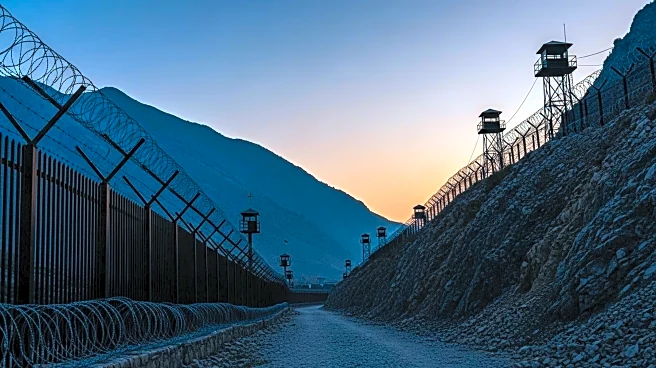What's Happening?
Afghanistan has reported the killing of 58 Pakistani soldiers during overnight border operations, following accusations against Pakistan for violating Afghan airspace and attacking a market in eastern Afghanistan. The Taliban government stated that its forces conducted retaliatory operations, destroying 20 Pakistani outposts along the Durand Line, the disputed border between the two countries. The clashes resulted in the deaths of nine Afghan soldiers and injuries to 16 others. Pakistan's Foreign Minister Ishaq Dar accused Afghanistan of unprovoked firing and raids, asserting that Pakistan's response targeted Taliban infrastructure and terrorist elements operating from Afghan soil. The border crossing at Torkham remained closed, exacerbating the security situation and affecting Afghan refugees attempting to leave Pakistan.
Why It's Important?
The border clashes between Afghanistan and Pakistan highlight the ongoing tensions and complex geopolitical dynamics in the region. Pakistan has accused Afghanistan of harboring terrorist groups, including the Tehrik-i-Taliban Pakistan (TTP), which poses a threat to its security. The situation underscores the fragile relationship between the two countries, with potential implications for regional stability. The closure of the Torkham border crossing impacts trade and the movement of refugees, further straining relations. The involvement of international stakeholders like Qatar and Saudi Arabia, who petitioned for a halt to operations, indicates the broader concern over regional security and the need for diplomatic solutions.
What's Next?
The immediate future may involve diplomatic efforts to de-escalate tensions, as suggested by the Taliban government's emphasis on dialogue and understanding. However, the potential for further military engagements remains, given the accusations and counter-accusations from both sides. The international community, particularly neighboring countries, may increase pressure on Afghanistan and Pakistan to resolve their disputes peacefully. Monitoring the situation will be crucial for assessing the impact on regional security and the humanitarian situation, especially concerning Afghan refugees.
Beyond the Headlines
The border conflict raises questions about the long-term implications for Afghanistan-Pakistan relations and the role of external actors in mediating peace. The historical context of the Durand Line, which Afghanistan has never formally recognized, continues to be a source of contention. The situation also highlights the challenges faced by the Taliban government in balancing internal security with diplomatic relations. The broader geopolitical landscape, including the influence of regional powers and the presence of militant groups, adds complexity to resolving the conflict.











